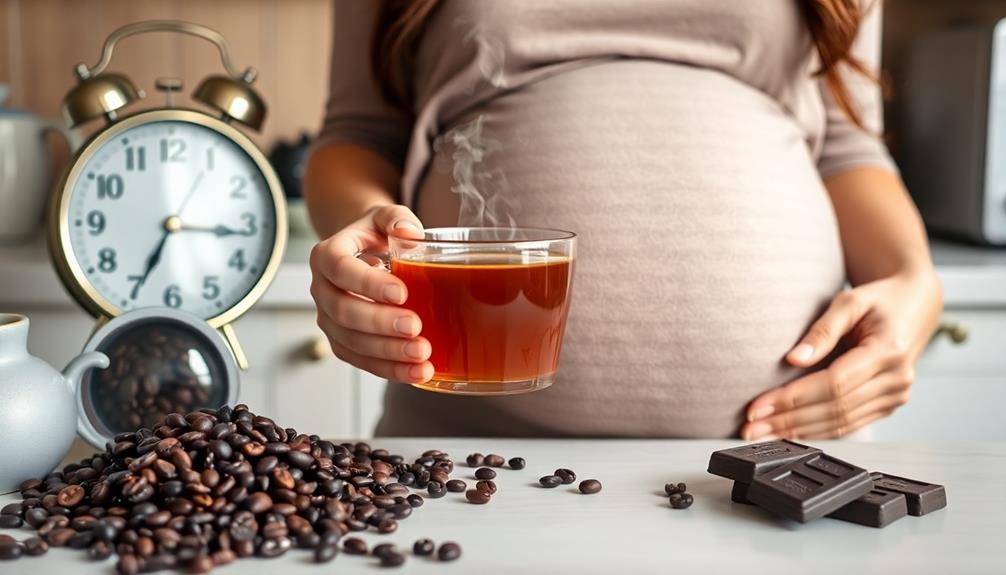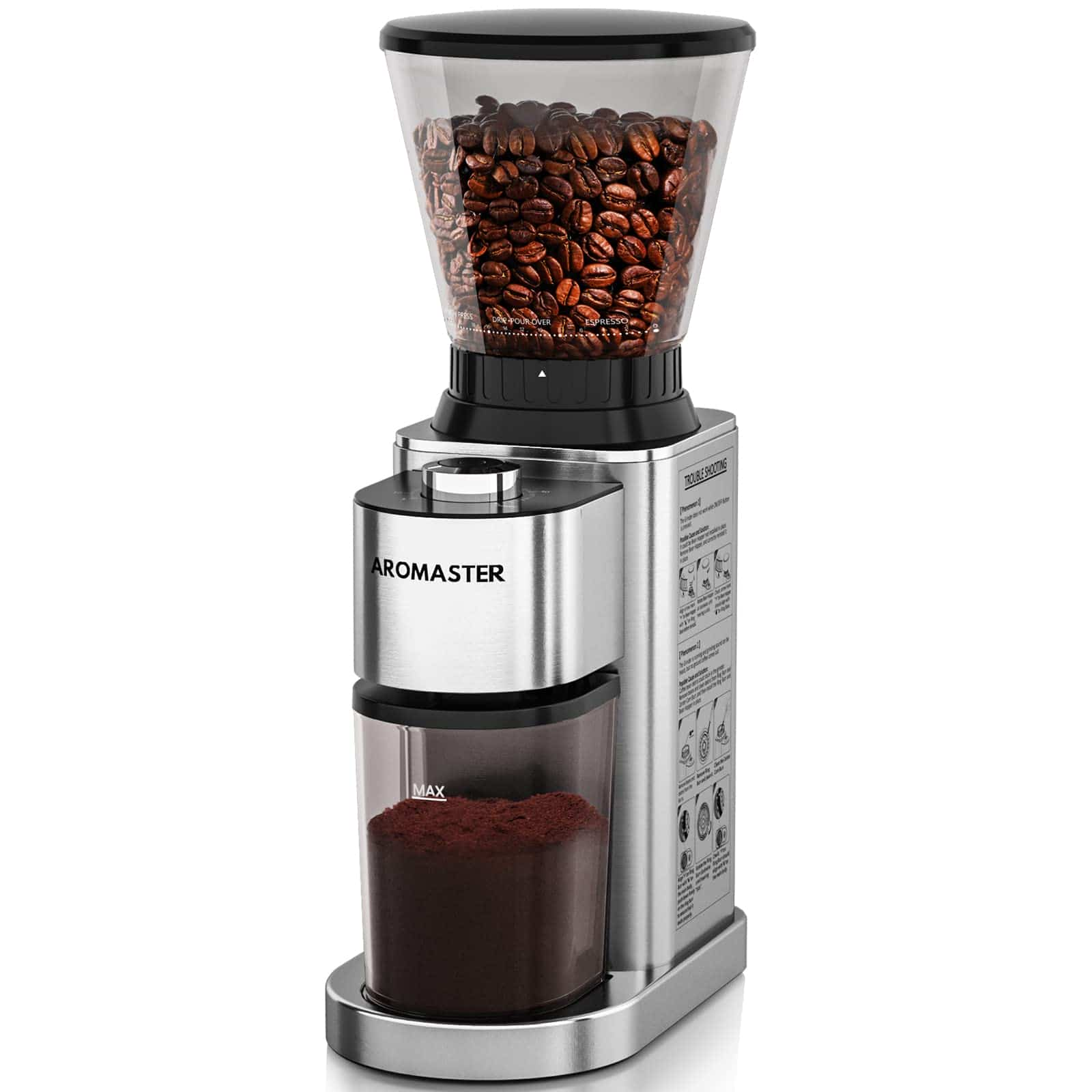Coffee, Tea and Alternatives and Health plus Fitness
Coffee and Seasonal Affective Disorder
Get ready to discover how coffee can be your secret weapon against Seasonal Affective Disorder and enhance your winter mood like never before.

Coffee can be a powerful ally if you're dealing with Seasonal Affective Disorder (SAD). It boosts your mood and keeps your energy up during those gloomy months. Regular caffeine intake enhances alertness and can even lower depression rates. The antioxidants in coffee may help combat oxidative stress, which affects your mood. Plus, sharing a cup of coffee can strengthen your social connections and offer emotional support—something you might need more in winter. So, if you're looking to manage SAD effectively, you might want to explore how coffee fits into a broader support plan.
Key Takeaways
- Coffee consumption can enhance mood and alleviate symptoms of Seasonal Affective Disorder (SAD) through its caffeine content and neuroprotective properties.
- Regular coffee intake supports alertness, improves concentration, and may reduce feelings of fatigue commonly associated with SAD.
- Sharing coffee with others fosters community and emotional support, which is particularly beneficial during the isolating winter months.
- Light exposure is crucial for managing SAD; coffee can complement this with its mood-enhancing effects.
- Lifestyle modifications, including coffee consumption, exercise, and light therapy, are effective strategies for managing SAD symptoms.
Understanding Seasonal Affective Disorder

Seasonal Affective Disorder (SAD) is a mood disorder that can impact you deeply during the winter months, as shorter days lead to reduced exposure to sunlight. If you're one of the approximately 3 in 100 people in the UK affected by SAD, you might notice increased feelings of sadness, anxiety, and irritability as winter sets in.
Your symptoms can manifest as a lack of energy and motivation, making it harder to concentrate or engage in regular activities. To combat these feelings, you might explore natural remedies that can complement your mental health efforts.
Biological factors play a significant role in SAD, particularly disruptions to your circadian rhythm and altered melatonin production due to decreased light exposure. These changes can negatively affect your mood and overall well-being.
To help manage SAD, consider integrating lifestyle modifications like regular exercise and a balanced diet, which can provide essential nutrients for mental health.
Incorporating mindfulness practices might also assist in managing your symptoms. Light therapy stands out as an effective treatment option, as it can help suppress melatonin production, thereby improving your mood.
Understanding these aspects of seasonal affective disorder can empower you to take proactive steps toward enhancing your mental health during the darker months.
Symptoms of Seasonal Depression

If you find yourself feeling irritable, lacking energy, or losing interest in activities during the winter, you might be experiencing symptoms of Seasonal Affective Disorder (SAD).
These symptoms can persist for at least two consecutive winters and greatly impact your daily life.
Understanding how these feelings manifest can help you recognize SAD and seek appropriate support.
Common Symptoms Experienced
During the colder months, many people find themselves grappling with the common symptoms of Seasonal Affective Disorder (SAD). You might notice a significant lack of energy that makes even simple tasks feel overwhelming.
As daylight diminishes, your mood could take a hit, leading to irritability and a general sense of sadness. It's not uncommon to lose interest in activities you once enjoyed, leaving you feeling disconnected from the world around you.
Concentration may become a challenge, with many individuals reporting difficulty focusing during these darker days. This can affect both your work and personal life, making it hard to stay engaged.
Additionally, you might find that your motivation for physical activity decreases, which can further contribute to feelings of lethargy and sadness.
You may also experience atypical symptoms, like increased sleep duration and cravings for carbohydrates, which can exacerbate fluctuations in mood.
Recognizing these symptoms is an important step toward understanding how SAD affects you, and it can pave the way for seeking the support or treatment you may need.
Duration of Symptoms
Symptoms of Seasonal Affective Disorder (SAD) can linger for several months, often peaking in the depths of winter. If you're experiencing these symptoms, it's vital to recognize that they can persist, sometimes requiring two consecutive winters for a formal diagnosis.
As the days grow shorter, your mood may dip considerably.
Here are three common symptoms you might notice during these winter months:
- Irritability: Little things can frustrate you more than usual, impacting your interactions with others.
- Increased Sleep Duration: You may find yourself sleeping more than normal, affecting your daily routine and energy levels.
- Heightened Appetite: Cravings for carbohydrates can spike, altering your diet and making you feel sluggish.
As daylight diminishes, these symptoms can become more pronounced.
If you're among the 3 in 100 individuals in the UK experiencing SAD, it's important to seek support. Understanding the duration of your symptoms can empower you to take proactive steps, whether through diet adjustments, light therapy, or professional help, to manage your seasonal affective disorder effectively.
Impact on Daily Life
Many people with Seasonal Affective Disorder (SAD) find their daily life considerably impacted as winter sets in. You might notice irritability, loss of interest, or a lack of energy that makes even simple daily activities feel overwhelming.
As daylight hours shorten, studies show about 28% of adults report increased sadness, while others feel anxious or struggle to concentrate. These symptoms can disrupt your routine, making it tough to stay motivated, especially to exercise.
The changes in your circadian rhythm due to reduced daylight can worsen these feelings. Higher melatonin levels can lead to fatigue and increased sleep duration, which might leave you feeling groggy and unproductive.
You may also crave carbohydrates, complicating your diet and further affecting your mood.
Incorporating coffee into your daily routine might help with mood improvement, providing a temporary boost to combat the effects of SAD. While it won't cure the disorder, it can enhance your alertness and potentially make those chilly, dark days a bit more bearable.
How Coffee Affects Mood

When you sip on a cup of coffee, you might notice a boost in your mood and energy levels.
Caffeine not only enhances alertness but also offers neuroprotective benefits that can help stabilize your mood during those darker winter months.
Plus, sharing a coffee with friends can add a social element that further uplifts your spirits.
Caffeine and Mood Enhancement
Coffee can be a powerful ally in enhancing your mood, especially during the winter months. When the days are shorter and Seasonal Affective Disorder (SAD) kicks in, a cup of coffee can provide the boost you need.
Regular consumption, about 75mg of caffeine per cup, is linked to sustained mood improvement and increased alertness. Studies suggest that coffee's rich content of antioxidants can also play a role in combating oxidative stress, which may contribute to mood enhancement fresh insights on coffee's health benefits.
Here's how coffee can benefit you:
- Natural Mood Stabilizer: About 20% of coffee drinkers report feeling happier after a cup, highlighting its potential to lift your spirits.
- Sustained Energy: Drinking coffee every four hours keeps your energy levels consistent, helping you stay focused and combat feelings of sadness.
- Lower Depression Levels: Higher coffee consumption correlates with lower depression rates, suggesting caffeine could offer protective benefits for your mental health.
Incorporating coffee into your routine can be a simple yet effective strategy for mood improvement.
Coffee's Neuroprotective Properties
While you might think of coffee primarily as a pick-me-up, its neuroprotective properties can greatly influence your mood, especially during the darker months.
Research shows that coffee contains polyphenols that may cross the blood-brain barrier, aiding in neuroprotection and promoting neurogenesis. Additionally, incorporating healthy coffee additives, such as nut milk or cinnamon, can enhance its benefits and flavor. This can enhance your mood stability during seasonal changes and might help alleviate symptoms of Seasonal Affective Disorder (SAD).
Regular consumption of coffee, particularly caffeine at around 75mg every four hours, has been linked to improved mood and increased alertness. Curiously, studies indicate that about 20% of adults report mood enhancement after drinking coffee, while 29% feel more energized. This highlights coffee's potential role in counteracting the mood fluctuations many experience during winter.
Additionally, research from the University of Catania suggests that coffee's micronutrients may support neuroinflammatory responses, reducing the risk of cognitive and affective disorders often associated with SAD.
Consistent coffee intake is also tied to a decreased risk of depression, making it a beneficial lifestyle choice for those maneuvering the mood challenges posed by shorter daylight hours. Embracing coffee could be a smart move for your mental well-being.
Social Aspects of Coffee
In many cultures, sharing a cup of coffee creates a sense of community that's especially important during the winter months. As you navigate the darker days, coffee can play a key role in enhancing your mood and connecting with others.
Regular coffee consumption not only boosts your alertness but also fosters social interactions that can help combat feelings associated with Seasonal Affective Disorder (SAD).
Here are three emotional benefits of coffee's social aspects:
- Connection: Meeting friends for coffee can lift your spirits and provide essential emotional support.
- Ritual: Having a daily coffee ritual can create a comforting routine, helping you cope with seasonal mood changes.
- Engagement: Sharing stories and laughter over coffee enhances feelings of belonging, which is important during the cold months.
Research shows that about 20% of adults experience mood enhancement after drinking coffee.
So, by enjoying a cup every four hours, you not only sustain your mood but also create opportunities for social engagement.
Embrace these moments, as they can greatly alleviate the effects of SAD and enrich your winter experience.
Caffeine's Role in Mental Health

Caffeine plays a significant role in enhancing mental health, particularly for those grappling with Seasonal Affective Disorder (SAD). Research shows that caffeine can improve mood, with 20% of adults reporting a positive mood shift after consumption. Regularly drinking coffee, which provides about 75mg of caffeine every four hours, can keep your spirits elevated and alertness on point.
Here's a quick overview of caffeine's benefits:
| Benefit | Description |
|---|---|
| Mood Enhancement | 20% of adults report improved mood post-consumption. |
| Natural Mood Stabilizer | Helps mitigate SAD symptoms during darker months. |
| Cognitive Benefits | Improves concentration and combats cognitive decline. |
| Supports Neurogenesis | Polyphenols in coffee may reduce cognitive disorder risk. |
Incorporating caffeine into your daily routine can be a natural way to boost your mood and mental sharpness. The cognitive benefits, combined with mood enhancement, make caffeine an essential ally in managing the effects of Seasonal Affective Disorder. So, consider that next cup of coffee—it might just be what you need to brighten your day!
Benefits of Coffee Consumption

Coffee offers a range of benefits that go beyond just caffeine. For those grappling with seasonal affective disorder (SAD), regular coffee consumption can be a game-changer.
Here are three compelling reasons to reach for that cup:
- Mood Improvement: Studies show that around 20% of coffee drinkers report a noticeable lift in their mood. With winter's dark days, a warm cup can brighten your outlook.
- Neuroinflammatory Effects: Coffee's polyphenols may help combat neuroinflammatory responses in the brain, potentially easing the symptoms of SAD. This means you're not just enjoying a beverage; you're supporting your mental health.
- Antioxidant Properties: Packed with antioxidants, coffee contributes to overall mental wellness. These properties can help you fend off the winter blues by promoting a healthier brain.
Coffee and Brain Function

When you sip on a cup of coffee, you're not just indulging in a warm beverage; you're also giving your brain a boost. Regular coffee consumption has been linked to sustained mood improvement, with about 20% of surveyed adults reporting enhanced mood after drinking coffee.
The caffeine in your cup can improve alertness and concentration, greatly benefiting cognitive function, especially during those dreary, low-light days when Seasonal Affective Disorder can set in.
What's more, coffee polyphenols may cross the blood-brain barrier, encouraging neurogenesis, which is the growth of new brain cells. This might provide protective effects against cognitive decline, helping you stay sharp.
Research also shows that caffeine can exert anti-neuroinflammatory effects, contributing to better brain health and mood stabilization.
Interestingly, individuals who drink coffee regularly report lower levels of depression, suggesting that your favorite brew might play a role in supporting your mental well-being.
Lifestyle Changes for SAD Relief

Making lifestyle changes can considerably help manage Seasonal Affective Disorder (SAD) and improve your overall mood during the winter months. By making intentional adjustments, you can actively combat seasonal depression and enhance your well-being. Here are three effective strategies:
- Regular Exercise: Engaging in physical activity boosts serotonin production, promoting mood improvement. Even a daily walk can have significant effects on your mental health.
- Balanced Diet Choices: Focus on a diet rich in complex carbohydrates and proteins. These foods help regulate serotonin and melatonin levels, which are essential for managing SAD symptoms.
- Consistent Sleep Schedule: Prioritize relaxation techniques and maintain a regular sleep routine. Improved sleep quality can reduce stress and elevate your mood.
Additionally, don't underestimate the importance of light exposure. Natural sunlight or light therapy can suppress melatonin production, further alleviating SAD symptoms.
While coffee can be a mood booster in moderation, keep an eye on your caffeine intake, as too much can lead to heightened anxiety.
The Connection Between Light and Mood

Light plays an essential role in regulating your mood and overall mental health, especially during the darker winter months. The reduced daylight can disrupt your body's circadian rhythm, leading to mood disorders like Seasonal Affective Disorder (SAD).
With less light exposure, your body produces more melatonin, which can make you feel sleepy and affect your mood negatively. Studies show that about 28% of adults report feeling sadder as daylight hours shorten.
Morning light exposure is vital for resetting your circadian clock. By getting sunlight in the morning, you can help alleviate symptoms of SAD.
If natural light is scarce, consider using light therapy boxes. These devices emit bright light that mimics natural sunlight, effectively suppressing melatonin production. This can be particularly helpful for those living in northern latitudes, where sunlight is limited during winter.
Incorporating these practices into your daily routine can have a significant impact on your mood.
Coffee as a Coping Mechanism

During the winter months, many people find solace in a warm cup of coffee, and for good reason.
Coffee isn't just a delicious beverage; it can be a powerful coping mechanism for those grappling with Seasonal Affective Disorder (SAD). Research shows that coffee consumption is linked to mood improvement, with about 20% of adults reporting elevated spirits after a cup.
Consider these points:
- Sustained Energy: Regular caffeine intake, around 75mg every four hours, can help maintain your mood throughout the day.
- Enhanced Focus: A study found that 21% of respondents experienced better alertness and concentration after drinking coffee, which can combat the cognitive challenges of SAD.
- Brain Health: The polyphenols in coffee offer neuroprotective effects that may support brain health, potentially easing some symptoms tied to seasonal mood changes.
Frequently Asked Questions
Can Coffee Help Anhedonia?
Yes, coffee can help with anhedonia. When you drink coffee, its caffeine boosts your mood and motivation, making you more likely to engage in enjoyable activities.
Regularly consuming caffeine can lead to lower depression levels and improved emotional well-being. A moderate intake, around 75mg every four hours, can sustain these mood enhancements.
Plus, the increased alertness and energy can combat fatigue, helping you overcome feelings of disinterest and apathy.
Why Does Coffee Lift My Depression?
Imagine your brain as a sluggish car engine on a cold morning, struggling to start. When you sip coffee, it's like adding a turbo boost.
Caffeine triggers the release of dopamine, lifting your mood and enhancing alertness. About 20% of folks experience a mood lift after a cup, while 29% feel energized.
This jolt can help you shake off feelings of lethargy, making it easier to tackle your day with a brighter outlook.
Why Does Coffee Affect My Mood so Much?
When you drink coffee, its caffeine boosts your mood by increasing alertness and energy levels.
This happens because caffeine blocks adenosine, a neurotransmitter that makes you feel tired. You may also experience a rush of dopamine, the feel-good hormone.
Additionally, the polyphenols in coffee can help reduce inflammation in your brain, which might enhance your overall mood.
Is Coffee Bad for Anxiety and Depression?
Did you know that 21% of people feel more anxious as daylight decreases?
When it comes to coffee and mental health, moderation is key. While a little caffeine can boost your mood and alertness, too much can increase anxiety, especially if you're already prone to it.
Balancing your coffee intake with healthy habits, like exercise and a balanced diet, can help you manage both anxiety and depression more effectively.
Conclusion
As the gray skies of winter close in like a heavy blanket, remember that your morning cup of coffee can be more than just a ritual. It's a warm embrace, lifting your spirits and sharpening your mind, much like the sun breaking through the clouds. By integrating coffee into your routine, you're not just chasing away the winter blues; you're inviting a bit of brightness into your day. Embrace this simple pleasure, and let it help you weather the storm.
In the vast and diverse world of coffee, coffee alternatives, and tea, Olivia has found her calling. As an author and a dedicated coffee and tea aficionado, her work for Cappuccino Oracle reflects her profound love and understanding of the intricate complexities found within these beverages. Olivia’s passion for the subject serves as both a catalyst for her creativity and a connection point with her audience.
Olivia’s appreciation for coffee, coffee alternatives, and tea blossomed at an early age. She discovered that these beverages invigorated her senses and stimulated her creative spirit. From the nuanced flavors of single-origin roasts to the captivating narratives intertwined with coffee, coffee alternatives, and tea trade and culture, Olivia found an unlimited source of inspiration in her daily cup.
Her love for these beverages and her talent for storytelling eventually converged at Cappuccino Oracle. As an author, Olivia’s mission is to illuminate the intricate tapestry that makes up the world of coffee, coffee alternatives, and tea. Her articles span a diverse range of topics, encompassing everything from the unique flavors of different brews to the sociocultural history intertwined with their cultivation and consumption.
Coffee, Tea and Alternatives and Health plus Fitness
Male Fertility and Coffee Consumption
Keen to understand how your coffee habits influence male fertility? Discover the surprising effects of caffeine on sperm quality and reproductive health.

Your coffee consumption can directly impact your male fertility. Studies show that moderate intake, about 1-2 cups a day, is generally safe and might even improve sperm motility. However, exceeding this amount can lower IVF success rates and negatively affect sperm quality, including motility and count. Excessive caffeine, particularly from sugary sodas, may disrupt hormonal levels and lead to reproductive health issues. To support your fertility, aim for a moderate caffeine intake of 2-3 cups daily. There's more to explore about the connections between lifestyle choices and fertility health that could be beneficial for you.
Key Takeaways
- Moderate coffee consumption (1-2 cups/day) is safe and may even improve sperm motility, supporting male fertility.
- Excessive coffee intake (2+ cups/day) is linked to decreased IVF success rates and impaired sperm quality.
- High caffeine intake can disrupt hormonal balance, potentially lowering testosterone and increasing estrogen levels in men.
- Sugar-laden beverages, especially cola, negatively impact sperm health and can trigger hormonal imbalances affecting fertility.
- Health professionals recommend limiting caffeine to 2-3 cups daily to support reproductive health and fertility.
Overview of Male Fertility

Understanding male fertility is essential for those looking to conceive. Approximately 7% of men globally face male infertility, which often stems from low sperm count, poor sperm motility, and abnormal sperm morphology.
If you're trying to conceive, it's vital to recognize how your lifestyle choices impact your reproductive health.
Diet plays a significant role; research shows that non-cola drinkers have an average sperm concentration of 56 million/mL, while high cola drinkers average only 40 million/mL. This suggests that what you consume can directly affect your sperm health.
Exercise is equally important, as maintaining a healthy weight can improve your overall fertility outcomes.
Moreover, environmental factors and exposure to toxins can further exacerbate the risk of male infertility. Unhealthy habits, such as smoking or excessive alcohol consumption, can also diminish your chances of conceiving.
Taking a holistic approach to your reproductive health means addressing these lifestyle choices and making positive changes. By understanding these aspects of male fertility, you can take proactive steps toward enhancing your chances of conception and addressing any potential male infertility issues.
Coffee Consumption and Caffeine

When it comes to coffee and fertility, caffeine plays an essential role that you need to take into account.
Excessive intake, especially beyond two cups a day, can lower your chances of successful IVF and may negatively affect sperm quality.
On the other hand, moderate consumption mightn't have a significant impact, so finding the right balance is key.
Caffeine's Impact on Fertility
Frequent coffee consumption can play a significant role in male fertility, with research showing varying effects based on the amount consumed. High caffeine intake, particularly from caffeinated sodas and energy drinks, can negatively impact sperm quality, leading to decreased motility and volume.
If you consume more than two cups of coffee daily, you might find that your chances of successful IVF pregnancies drop below 20%. On the other hand, those who limit their intake to less than one cup daily enjoy over a 50% success rate.
Interestingly, some studies suggest that moderate coffee consumption—about one to two cups per day—may not adversely affect male fertility. In fact, a Brazilian study found a correlation between higher coffee consumption and improved sperm motility, indicating potential benefits from moderate intake.
However, be cautious of the sugar content in caffeinated beverages like cola, as excess sugar has been linked to decreased sperm count and function.
Ultimately, while caffeine affects male fertility, the key lies in finding a balance that works for you. Moderation appears to be the safest approach when it comes to coffee and fertility.
Recommended Coffee Intake Levels
To promote ideal male fertility, it's essential to be mindful of your coffee intake. Research suggests that moderate coffee consumption—typically defined as 1-2 cups daily—can be safe for maintaining reproductive health. Each cup of coffee contains about 96 mg of caffeine, placing your caffeine intake well within the recommended coffee intake levels when you stick to this guideline.
Studies show that a low (101-200 mg) to moderate (201-800 mg) caffeine intake doesn't negatively affect semen quality. This means you can enjoy your daily cups without worrying too much about impairing your fertility.
However, if you consume more than 2 cups a day, you might face potential risks. Excessive coffee consumption has been linked to lower success rates in assisted reproductive technologies like IVF, as well as impaired sperm quality and motility.
Health professionals generally recommend limiting your caffeine intake to 2-3 cups per day to avoid any negative impacts on your reproductive health. By keeping your consumption within these recommended levels, you'll be taking a proactive step toward supporting your fertility.
Study Findings on Semen Quality

When it comes to caffeine's impact on sperm quality, research shows mixed results.
While moderate coffee consumption seems safe, high cola intake might negatively affect sperm concentration.
It's important to evaluate consumption guidelines and the limitations of available studies as you assess your own habits.
Caffeine's Impact on Sperm
Numerous studies have explored caffeine's impact on sperm health, revealing a complex relationship between consumption levels and semen quality. For instance, a significant study of 2,554 young Danish men found that high cola consumption—more than 14 half-liter bottles a week—led to reduced sperm concentration and total sperm count. This suggests that cola's unique ingredients might negatively affect sperm independent of caffeine intake.
When it comes to moderate caffeine intake, researchers observed no significant effects on semen quality. Low intake, defined as less than 100 mg per day, also showed no correlation with reduced sperm parameters. Notably, non-cola drinkers had higher sperm concentrations compared to those who consumed high amounts of cola, emphasizing the potential risks associated with cola drinks.
However, some studies indicated that excessive coffee consumption could lower IVF success rates. Men drinking two or more cups daily had less than a 20% chance of pregnancy, while those consuming under one cup daily boasted over a 50% success rate.
Coffee Consumption Guidelines
Excessive coffee consumption can greatly impact male fertility, particularly for those undergoing IVF treatments. Studies show that drinking two or more cups daily may reduce your chances of pregnancy to less than 20%, compared to over 50% for those who consume less than one cup daily.
To adhere to effective coffee consumption guidelines for fertility, aim for moderate intake of about 1-2 cups daily. This amount, which translates to roughly 96 mg of caffeine per cup, is generally considered safe and unlikely to harm semen quality.
However, it's essential to remain cautious about high caffeine intake, as some research indicates it could lead to decreased sperm quality and motility. This suggests that there's a potential threshold effect, where moderation becomes critical for maintaining reproductive health.
Additionally, consider the sugar in caffeinated soft drinks, which may further complicate the effects on sperm health. Ultimately, while moderate coffee consumption might've neutral effects, excessive intake could pose risks.
Keep these guidelines in mind to support your fertility journey effectively.
Research Limitations and Variability
Research on how coffee consumption affects semen quality presents a complex picture. You might find that studies yield mixed results, with some indicating that excessive coffee intake can impair male fertility by reducing sperm quality and motility.
For instance, a notable study at the ASRM annual conference revealed that men who consumed two or more cups daily had less than a 20% chance of achieving pregnancy through IVF, compared to over 50% for those drinking less than one cup.
While moderate coffee consumption appears to have neutral effects, high caffeine intake may lead to diminished semen volume and sperm count.
Additionally, a 2010 study pointed out that cola drinkers showed decreased semen volume and sperm count, suggesting that the combination of sugar and caffeine in soft drinks could uniquely impact male reproductive health.
These findings highlight significant research limitations, as the variability in results often stems from differing methodologies, sample sizes, and individual lifestyle factors.
Because of this, further research is essential to clarify the complex relationship between coffee consumption, caffeine levels, and male fertility outcomes. Understanding these nuances can help you make informed choices about your coffee habits.
High Coffee Intake Risks

When it comes to male fertility, high coffee intake can pose significant risks. If you're consuming two or more cups daily, your chance of achieving pregnancy through IVF drops to less than 20%, compared to over 50% for those drinking less than one cup. This stark difference highlights the potential impact of your coffee habit on sperm quality.
Studies show that excessive coffee consumption is linked to decreased sperm motility and abnormal morphology, which can hinder your chances of conception. Additionally, a 2010 study found that cola drinkers, often consuming caffeine, exhibited reduced semen volume and sperm count. This suggests that caffeine might be affecting not just your sperm count but also the overall health of your sperm.
Moreover, high caffeine intake can disrupt hormonal levels in men, further complicating fertility issues. To mitigate these potential risks, consider limiting your coffee consumption to 2-3 cups per day.
Lifestyle Factors Affecting Fertility

While many factors contribute to male fertility, lifestyle choices play an essential role in determining sperm quality and overall reproductive health. Unhealthy lifestyle habits can greatly impact your fertility, leading to lower sperm counts and decreased semen quality.
For instance, excessive caffeine intake—particularly from soft drinks—has been linked to reduced semen volume and sperm count. If you're consuming more than two cups of coffee daily, you might be jeopardizing your chances of conception, especially if you're considering IVF. Incorporating regular physical activity and prioritizing a balanced diet rich in fruits, vegetables, and whole grains can further enhance your reproductive health.
Moreover, heavy alcohol consumption can impair sperm quality and increase the risk of miscarriage, so moderation is essential. Smoking also poses a considerable risk, affecting both sperm health and overall reproductive viability.
On the flip side, adopting healthier lifestyle habits can support your fertility. Regular exercise and a balanced diet can counteract some adverse effects of poor choices, helping you maintain ideal reproductive health.
If you're planning for a family, taking control of your lifestyle habits is essential. By making small, positive changes, you can greatly improve your chances of successful conception.
Caffeine's Impact on Hormones

Caffeine can disrupt your hormonal balance, particularly affecting testosterone levels, which is essential for fertility.
If you consume more than two cups of coffee a day, you might notice variations in these hormone levels, potentially impacting sperm production.
Understanding how caffeine influences hormones like estrogen is important for maintaining reproductive health.
Hormonal Balance Disruption
Altering hormone levels through high caffeine intake can greatly impact male fertility. When you consume excessive caffeine, particularly from coffee, you may disrupt your hormonal balance, which is critical for reproductive health.
Research shows that high caffeine intake could lower luteinizing hormone (LH) levels, significant for regulating testosterone production. This disruption can interfere with the hypothalamic-pituitary-gonadal axis, ultimately affecting the hormonal signals necessary for sperm production.
Moreover, caffeine may lead to increased estrogen levels in men, contributing further to hormonal imbalances that can hinder fertility. The relationship between caffeine and hormone levels isn't the same for everyone; individual responses can vary widely.
It's important to reflect on how your unique body reacts to caffeine when evaluating its impact on your reproductive health. As you think about your coffee consumption, keep in mind that maintaining a healthy hormonal balance is crucial for ideal fertility.
If you're concerned about how caffeine might be affecting your hormonal levels, a personalized evaluation could provide insights tailored to your specific situation. Balancing coffee intake with awareness of its potential effects on hormones can be a wise step towards supporting your fertility.
Testosterone Levels Variation
Maintaining a hormonal balance is key to your reproductive health, and testosterone levels play a vital role in this equation. You mightn't realize that your coffee consumption can considerably impact testosterone levels variation.
Studies indicate that high caffeine intake may lead to fluctuations in testosterone, and excessive consumption—like drinking more than three cups daily—could actually lower your testosterone levels.
In contrast, moderate caffeine intake, around 200-400 mg per day, seems to maintain stable testosterone levels for many men. This suggests a potential threshold effect, where too much caffeine might disrupt your hormonal balance.
While caffeine may give a temporary boost to testosterone, chronic high intake can lead to long-term hormonal imbalances.
The relationship between caffeine and testosterone is complex, and it's important to remember that individual responses can vary based on factors like genetics and overall health.
Estrogen Influence on Fertility
Understanding how various substances affect your hormone levels is vital for fertility, especially regarding estrogen's role. Caffeine, often enjoyed in your daily cup of coffee, can have surprising effects on your hormonal balance. Some studies suggest that high caffeine intake might lead to decreased estrogen levels in men, which can greatly impact sperm production and overall fertility.
Caffeine's Impact on Estrogen and Fertility
| Hormonal Effect | Potential Consequence | Emotional Impact |
|---|---|---|
| Decreased Estrogen | Lower sperm production | Anxiety about fatherhood |
| Hormonal Fluctuations | Disrupted reproductive health | Frustration in relationships |
| Imbalanced Hormones | Reduced fertility outcomes | Hopelessness in trying to conceive |
| Lower Sperm Quality | Compromised reproductive potential | Fear of infertility |
| Decreased Motility | Challenges in conception | Stress about future family |
Excessive coffee consumption can lead to hormonal disruptions that interfere with the normal reproductive hormone axis in men. With caffeine's potential to alter testosterone levels and decrease estrogen, understanding its impact on your fertility is vital. Prioritizing a balanced lifestyle may help support your reproductive health and improve your chances of conception.
The Role of Sugar in Beverages

Sugar plays a significant role in the beverages we consume daily, especially when it comes to soft drinks and energy drinks. These sugary drinks are major sources of added sugars in the U.S., and their consumption can negatively affect sperm quality. Excessive sugar intake has been linked to various metabolic issues, which may further worsen fertility problems in men.
The combination of caffeine and sugar found in cola drinks can have a compounding negative effect on sperm health. Both components can impact reproductive outcomes, leading to concerns about their long-term effects.
Studies suggest that high sugar intake can trigger hormonal imbalances, potentially affecting testosterone levels and overall reproductive health in males.
Understanding the role of sugar in caffeinated beverages is essential for evaluating their overall impact on male fertility. You might want to think about moderating your consumption of these drinks to help maintain ideal sperm quality.
As you navigate your dietary choices, keep in mind that reducing sugar intake could benefit not just your general health but also your reproductive health. Balancing your beverage choices can play a significant role in supporting your fertility goals.
Recommendations for Healthy Intake

When it comes to coffee consumption and male fertility, striking a balance is key. You should limit your intake to 2-3 cups of coffee per day. Excessive coffee consumption may impair male fertility and reduce the chances of successful IVF outcomes.
While moderate caffeine intake, ranging from 101-800 mg per day, hasn't been considerably linked to reduced semen quality, it's wise to err on the side of caution. The average cup of coffee contains about 96 mg of caffeine, so sticking to 1-2 cups daily is generally considered safe for maintaining ideal fertility.
In addition to monitoring your caffeine intake, pay attention to the sugar content in your caffeinated beverages. High sugar consumption can negatively impact sperm count and function, potentially exacerbating any effects from caffeine.
Always remember to consult with your healthcare provider regarding your caffeine and dietary habits, especially if you're concerned about fertility. Following these recommendations for healthy intake can help you enjoy your coffee while supporting your reproductive health.
Balancing your coffee consumption with a mindful approach could make a difference for your fertility journey.
Alternative Perspectives on Caffeine

While many studies highlight the potential risks of high caffeine intake on male fertility, there are also alternative perspectives worth considering.
Research shows mixed evidence regarding caffeine's impact on sperm quality. While some studies link excessive coffee consumption—over two cups daily—to reduced sperm motility and lower sperm count, others suggest that moderate caffeine intake mightn't harm fertility and could even enhance sperm motility in certain cases. This indicates that not all caffeine consumption is detrimental.
Moreover, the influence of sugar in caffeinated beverages, especially colas, complicates the evaluation of caffeine's effects. Excessive sugar intake has its own negative implications for male fertility, which could skew the results regarding caffeine. As a result, it's essential to separate the effects of caffeine from those of added sugars.
Given these nuances, moderation seems to be the key. Guidelines suggest limiting caffeine intake to 2-3 cups per day for ideal fertility outcomes.
This balanced approach allows you to enjoy coffee while remaining mindful of your reproductive health. Ultimately, considering these alternative perspectives on caffeine can provide a more thorough understanding of its role in male fertility.
Understanding Male Infertility Causes

Understanding the causes of male infertility is essential for addressing reproductive health concerns effectively. Male infertility affects about 7% of men globally, with common contributors being low sperm count, poor sperm motility, and abnormal sperm morphology.
Your lifestyle choices play a notable role in your reproductive health. Unhealthy diets, lack of exercise, and substance use can adversely affect sperm quality.
Additionally, physical problems, hormonal imbalances, and advanced paternal age can contribute to infertility. As you age, sperm quality tends to decline, making it important to evaluate age-related factors during assessments.
Environmental toxins and occupational hazards are also significant contributors, so being aware of your surroundings is crucial.
To develop effective treatment plans, a thorough evaluation that includes your lifestyle factors—like caffeine and sugar intake—is necessary.
Frequently Asked Questions
Does Coffee Affect Fertility in Males?
You might wonder if coffee affects fertility in males. Research shows mixed results; excessive coffee consumption could lead to decreased sperm quality and motility.
However, moderate intake—around one to two cups daily—seems safe and mightn't greatly impact semen quality.
It's crucial to stay informed, as ongoing studies continue to explore this topic. Ultimately, balancing your coffee habits while considering overall health is a smart approach to take.
Should Men Stop Drinking Coffee When Trying to Conceive?
Life's a balancing act, and coffee can tip the scales.
If you're trying to conceive, it might be wise to reconsider your coffee habit. While enjoying a cup occasionally won't likely hurt, high consumption could lower your chances.
Moderation is key; limit yourself to one cup daily or less. By doing so, you'll not only promote better reproductive health but also keep the joy of that morning ritual intact.
Is Caffeine or Alcohol Worse for Sperm?
When considering caffeine and alcohol, you might find alcohol to be the more significant concern for sperm health.
Heavy drinking can lead to decreased libido and compromised sperm quality, making it a bigger risk.
While caffeine can have mixed effects, moderate coffee intake isn't usually harmful.
However, if you're consuming excessive caffeine, it could still impact your overall health.
Prioritize moderation in both to support your well-being and fertility.
Are Energy Drinks Bad for Male Fertility?
Like a double-edged sword, energy drinks can cut both ways for your health.
When it comes to male fertility, these drinks aren't doing you any favors. High caffeine and sugar levels might lead to decreased sperm quality, affecting your reproductive health.
Studies suggest that regular consumption could reduce sperm count and motility.
Conclusion
In traversing the complex world of male fertility, think of your body as a finely tuned orchestra. Just as a single off-key note can disrupt harmony, high coffee consumption may impact your semen quality. Research shows that excessive caffeine can be detrimental, yet moderation is key. By balancing your coffee intake and considering lifestyle factors, you can create a symphony of health that supports your fertility journey. So, savor your coffee, but remember to keep the rhythm in check.
In the vast and diverse world of coffee, coffee alternatives, and tea, Olivia has found her calling. As an author and a dedicated coffee and tea aficionado, her work for Cappuccino Oracle reflects her profound love and understanding of the intricate complexities found within these beverages. Olivia’s passion for the subject serves as both a catalyst for her creativity and a connection point with her audience.
Olivia’s appreciation for coffee, coffee alternatives, and tea blossomed at an early age. She discovered that these beverages invigorated her senses and stimulated her creative spirit. From the nuanced flavors of single-origin roasts to the captivating narratives intertwined with coffee, coffee alternatives, and tea trade and culture, Olivia found an unlimited source of inspiration in her daily cup.
Her love for these beverages and her talent for storytelling eventually converged at Cappuccino Oracle. As an author, Olivia’s mission is to illuminate the intricate tapestry that makes up the world of coffee, coffee alternatives, and tea. Her articles span a diverse range of topics, encompassing everything from the unique flavors of different brews to the sociocultural history intertwined with their cultivation and consumption.
Coffee, Tea and Alternatives and Health plus Fitness
Coffee’s Impact on Female Fertility
In exploring coffee’s impact on female fertility, you’ll discover surprising insights that could influence your conception journey. What might you be overlooking?

Coffee's impact on female fertility mainly hinges on caffeine intake. High caffeine levels can delay conception and increase the risk of miscarriage. If you're trying to conceive, it's best to stick to a limit of around 200mg per day, roughly two cups of coffee. Curiously, moderate coffee consumption may support higher pregnancy rates, especially for those undergoing treatments like IUI. Keep in mind that caffeine can affect hormonal balance and egg quality. Want to understand more about how to balance your coffee habits for better reproductive health? There's plenty more to uncover.
Key Takeaways
- High caffeine intake, particularly from coffee, may increase the risk of miscarriage and prolong time to conception in women.
- Moderate coffee consumption (up to 200mg/day) may not adversely affect fertility and could be linked to higher pregnancy rates during IUI.
- Each additional cup of tea consumed is associated with a 27% decrease in infertility risk for women.
- Caffeine can influence egg quality and hormonal balance, potentially impacting female reproductive health.
- Monitoring all caffeine sources, including coffee, tea, and energy drinks, is crucial for managing intake while trying to conceive.
Understanding Caffeine and Its Sources

Caffeine, a common stimulant found in coffee, tea, and various other beverages, plays a significant role in your daily routine.
It's important to understand the sources of caffeine and how they can impact your health, particularly if you're a woman trying to conceive or pregnant. Additionally, certain herbal alternatives, like natural alternatives to synthetic botox, can be beneficial for overall wellness during this time.
The average cup of coffee contains about 85mg of caffeine, but this can vary based on preparation and bean type. While enjoying your morning brew or that afternoon tea, it's essential to monitor your total caffeine consumption.
For women aiming for fertility or who are pregnant, the recommended daily caffeine limit is around 200mg, roughly equivalent to two cups of coffee. High caffeine intake may lead to risks like prolonged time to conception and increased miscarriage rates.
Although definitive proof linking caffeine directly to fertility issues is inconclusive, the potential health risks remain a concern.
Caffeine easily crosses the placenta, and pregnant women may metabolize it more slowly, heightening sensitivity to its effects.
Caffeine's Effects on Male Fertility

When it comes to male fertility, the impact of caffeine has sparked substantial interest among researchers and health professionals. You've probably heard that caffeine consumption can play a role in reproductive health, but the specifics are still being explored.
Some studies indicate that high caffeine consumption may negatively affect sperm quality, though the relationship between caffeine and male fertility isn't entirely clear.
Lifestyle factors, including your caffeine intake, can greatly influence your overall reproductive performance and fertility outcomes. While moderate caffeine consumption typically doesn't show any major adverse effects, excessive intake has raised red flags.
It's essential to recognize that the current research provides mixed results, leaving us with more questions than answers.
Further research is needed to clarify caffeine's role in male fertility. If you're concerned about how your caffeine habits may impact your reproductive health, it might be wise to monitor your intake.
Balancing caffeine consumption could be key, as high caffeine consumption warrants caution while moderate levels may be acceptable. Staying informed about these factors will help you make better lifestyle choices for your reproductive health.
Caffeine's Effects on Female Fertility

Understanding how caffeine affects fertility isn't just vital for men; it's equally essential for women. Your caffeine consumption can notably impact your reproductive health, especially if you're trying to conceive.
Research suggests that while high caffeine intake may increase the risk of miscarriage and prolong time to conception, moderate caffeine intake—around 200mg per day—might have different implications.
Daily coffee consumption, particularly in the range of 1-5 cups, has been linked to higher pregnancy rates in women undergoing intrauterine insemination (IUI). Curiously, studies show no clear correlation between overall caffeine consumption and primary infertility risk. This means that moderate coffee drinking mightn't hinder your fertility as you might fear.
On the other hand, tea consumption seems to have a negative association with infertility. Each additional cup of tea could decrease infertility risk by 27%.
The potential mechanisms through which caffeine may affect female fertility include its influence on egg quality and hormonal balance, although more research is needed to fully understand these effects.
Balancing your caffeine intake could be vital as you navigate your journey toward conception.
Recommended Caffeine Guidelines

If you're trying to conceive or are already pregnant, it's important to pay attention to your caffeine intake. The recommended daily limit for women in this situation is 200mg, which is about two cups of coffee. Staying within this guideline can help protect your health and enhance your fertility.
High caffeine consumption, defined as more than 200mg per day, may increase the risks of miscarriage and could lead to delays in conception. To manage your total caffeine intake effectively, monitor all sources, including coffee, tea, energy drinks, and even chocolate.
Reducing your caffeine consumption can be a proactive step towards improving your reproductive health and enhancing fertility outcomes.
Every woman's situation is unique, so it's wise to consult with your healthcare provider for personalized guidance on caffeine consumption during preconception and pregnancy. They can help you assess your individual circumstances and provide tailored recommendations.
Resources for Further Reading

Exploring the topic of caffeine and fertility can be overwhelming, but there are plenty of resources available to help you navigate this complex issue. Understanding the effects of caffeine consumption on female fertility is essential, especially when considering pregnancy likelihood and infertility risk.
Here's a quick guide to some valuable resources:
| Resource Type | Description | Link |
|---|---|---|
| Scientific Studies | Research on coffee and caffeine intake | [PubMed](https://pubmed.ncbi.nlm.nih.gov) |
| Holistic Approaches | Guides on diet and reproductive health | [Nutrition Journal](https://nutritionj.com) |
| Infertility Support | Community insights and experiences | [Resolve](https://resolve.org) |
Frequently Asked Questions
Does Coffee Affect Fertility in Females?
When you ask if coffee affects fertility in females, the evidence suggests that moderate consumption doesn't greatly increase infertility risks.
Studies indicate that women who enjoy 1-5 cups daily during fertility treatments may even see higher pregnancy rates.
While high caffeine intake could potentially pose risks, sticking to moderate levels, around 200 mg per day, is generally considered safe.
It's important to stay informed and listen to your body when making choices about caffeine.
Should I Stop Drinking Coffee When Trying to Conceive?
Is your morning cup of coffee a friend or foe?
When you're trying to conceive, it's wise to contemplate your caffeine intake. Experts recommend limiting it to about 200mg daily to enhance your chances.
However, moderate consumption mightn't harm your fertility, and some studies even hint at potential benefits during treatments like IUI.
Ultimately, it's about finding a balance that works for you while ensuring you're keeping track of your overall health.
Does Coffee Affect the Uterus?
Coffee's effects on your uterus can be complex.
While moderate consumption mightn't harm your reproductive health, excessive caffeine intake could lead to complications.
It's important to take into account how caffeine interacts with your body and any potential impacts on uterine health.
If you're particularly sensitive to caffeine or have concerns, it's wise to limit your intake.
Always consult your healthcare provider for personalized advice to guarantee your well-being.
Can Caffeine Impact Implantation?
Caffeine can impact implantation in various ways. It influences hormonal balance, which may affect how well a fertilized egg attaches to the uterine lining.
High caffeine intake has been linked to an increased risk of miscarriage, suggesting it might hinder implantation success. Additionally, caffeine crosses the placenta and can affect fetal development.
To minimize risks, it's wise to monitor your caffeine consumption, especially if you're planning to conceive or are already pregnant.
Conclusion
In the journey of fertility, think of caffeine as a double-edged sword—its energy boost can light your path, but too much can cast shadows. By balancing your intake, you can nurture your body like a gardener tending to delicate blooms. Remember, each choice you make is a seed planted for the future. Embrace moderation, and let your body flourish as you navigate the beautiful, complex landscape of fertility. Your health and dreams deserve that care.
In the vast and diverse world of coffee, coffee alternatives, and tea, Olivia has found her calling. As an author and a dedicated coffee and tea aficionado, her work for Cappuccino Oracle reflects her profound love and understanding of the intricate complexities found within these beverages. Olivia’s passion for the subject serves as both a catalyst for her creativity and a connection point with her audience.
Olivia’s appreciation for coffee, coffee alternatives, and tea blossomed at an early age. She discovered that these beverages invigorated her senses and stimulated her creative spirit. From the nuanced flavors of single-origin roasts to the captivating narratives intertwined with coffee, coffee alternatives, and tea trade and culture, Olivia found an unlimited source of inspiration in her daily cup.
Her love for these beverages and her talent for storytelling eventually converged at Cappuccino Oracle. As an author, Olivia’s mission is to illuminate the intricate tapestry that makes up the world of coffee, coffee alternatives, and tea. Her articles span a diverse range of topics, encompassing everything from the unique flavors of different brews to the sociocultural history intertwined with their cultivation and consumption.
Coffee, Tea and Alternatives and Health plus Fitness
Safe Coffee Limits During Pregnancy
Discover the safe coffee limits during pregnancy to protect your baby’s health, but are you aware of all the hidden sources of caffeine?

During pregnancy, it's important to limit your coffee intake to no more than 200 mg of caffeine per day, which is about one 12 oz cup. Caffeine crosses the placenta and can affect your baby's development, so moderation is key. Consuming more than 300 mg daily can lead to risks like low birth weight and miscarriage. Be mindful that caffeine is also found in tea, soft drinks, and chocolate. Checking labels is essential since hidden sources may contribute to your total intake. There's plenty more to evaluate as you navigate this topic, ensuring you and your baby stay healthy.
Key Takeaways
- Pregnant women should limit caffeine intake to less than 200 mg per day, roughly equivalent to one 12 oz cup of coffee.
- Brewed coffee contains 95-165 mg of caffeine per 8 oz, so portion control is essential.
- Caffeine metabolism slows during pregnancy, increasing fetal exposure and necessitating careful monitoring of intake.
- High caffeine consumption is linked to risks such as low birth weight, miscarriage, and preterm birth.
- Always consult healthcare providers for personalized advice on caffeine consumption during pregnancy.
Understanding Caffeine and Pregnancy

When you're pregnant, understanding caffeine's impact on your body is important. Caffeine, found in coffee and other beverages, crosses the placenta, which means it can influence your baby's development and metabolism. This can potentially alter your baby's sleep and movement patterns, making it essential to limit your intake.
The American College of Obstetricians and Gynecologists recommends keeping maternal caffeine consumption below 200 mg per day—about the amount in one 12-ounce cup of coffee.
During pregnancy, your body metabolizes caffeine more slowly, resulting in its prolonged presence in your bloodstream. This means even moderate caffeine consumption can have more pronounced effects than when you're not pregnant.
While studies indicate that low-to-moderate caffeine consumption isn't significantly linked to severe adverse outcomes like gestational diabetes, hypertension, or preeclampsia, it's still important to be cautious.
There's also some evidence suggesting high caffeine intake could contribute to low birth weight, so discussing your dietary habits with your healthcare provider is essential. Staying informed helps you make the best choices for your health and your baby's development throughout pregnancy.
Recommended Caffeine Limits

Limiting caffeine intake during pregnancy is crucial for both your health and your baby's development. The recommended caffeine limits for pregnant women are less than 200 mg per day, which is approximately equivalent to one 12 oz cup of coffee daily. The American College of Obstetricians and Gynecologists (ACOG) supports this guideline to minimize potential risks during pregnancy.
Be mindful that caffeine is found in various beverages, and an 8 oz cup of brewed coffee can contain between 95-165 mg of caffeine, depending on how it's prepared. It's important to track your caffeine consumption during pregnancy, as even a moderate amount can add up quickly from multiple sources, including tea, sodas, and chocolate.
Interestingly, studies suggest that consuming up to 100 mg of caffeine daily during the second trimester may actually reduce the risk of gestational diabetes by 47%.
However, every pregnancy is unique, so it's wise to consult with your healthcare provider for personalized guidance on managing your caffeine intake. Keeping your caffeine intake to less than 200 mg will help guarantee the best possible outcome for you and your baby.
Effects of Caffeine on Pregnancy

Caffeine can greatly impact pregnancy, making it important to understand its effects on both you and your baby. During pregnancy, your body processes caffeine differently, leading to a slower metabolism and prolonged presence of caffeine in your bloodstream. This can increase your blood pressure and heart rate, potentially posing risks to your health.
Caffeine crosses the placenta, which means your baby is also exposed to it. Studies suggest that excessive caffeine intake may be linked to low birth weight and adverse fetal development. It can also alter your baby's sleep and movement patterns in the womb.
To minimize risks, moderate levels of caffeine consumption—generally under 200 mg per day—are considered safe for most pregnant women. However, it's vital to consult your healthcare provider for personalized recommendations regarding caffeine intake.
They can help you navigate the potential effects of caffeine on pregnancy so you can make informed choices for your health and your baby's well-being. Remember, understanding the implications of caffeine is key to ensuring a healthy pregnancy.
Caffeine Sources to Consider

Many people don't realize how prevalent caffeine is in everyday products, making it crucial to be aware of your sources during pregnancy.
Coffee is a common source, with brewed coffee containing about 95-165 mg of caffeine per 8 oz. Espresso has even more, with 47-64 mg per 1 oz.
Tea also contributes, ranging from 20-70 mg of caffeine per 8 oz.
Don't forget about soft drinks; for example, Dr. Pepper contains around 37 mg of caffeine in a 12 oz serving.
Energy drinks can be particularly concerning, as some brands can pack up to 500 mg of caffeine in a 24-ounce serving.
Foods and drinks like chocolate products, including hot cocoa and dark chocolate, can add to your caffeine intake as well, with dark chocolate containing approximately 12-50 mg per ounce.
Additionally, over-the-counter medications, especially pain relievers and cold medications, may contain hidden caffeine, so it's important to check labels.
Herbal products such as guarana and yerba mate may also have caffeine, but they often lack clear labeling.
To maintain a healthy pregnancy, be mindful of these caffeine levels and limit caffeine accordingly.
Caffeine Metabolism Changes

During pregnancy, your body processes caffeine more slowly, which means caffeine stays in your system longer.
This slower clearance can lead to increased exposure for your developing fetus, who can't metabolize caffeine like you do.
It's important to understand these changes to manage your caffeine intake effectively.
Caffeine Clearance Rates
Understanding how pregnancy affects caffeine clearance rates is vital for expectant mothers. During pregnancy, your body experiences hormonal changes that slow down caffeine metabolism. This can lead to a 25-50% decrease in caffeine clearance rates, meaning it takes longer for your body to eliminate caffeine.
Here are a few key points to contemplate:
- Placenta's Role: Caffeine can easily cross the placenta, exposing the fetus to caffeine for extended periods.
- Increased Sensitivity: Pregnant women might feel caffeine effects more intensely, requiring careful monitoring of caffeine consumption.
- Individual Variability: Factors like genetics and existing health conditions can influence how each pregnant woman metabolizes caffeine.
Due to these changes, it's important to adjust your caffeine intake during pregnancy. Limiting consumption can help guarantee that caffeine levels in your bloodstream—and subsequently in your breast milk—stay within recommended limits.
Be mindful of how your body reacts to caffeine, and consult your healthcare provider to find the right balance for you and your baby's health.
Fetal Caffeine Exposure
As a pregnant woman, you should be aware that caffeine metabolism changes considerably, leading to increased fetal exposure. During pregnancy, your body clears caffeine much more slowly than before, which means caffeine and its metabolites linger in your bloodstream longer. This prolonged presence can raise the amount of caffeine that reaches your fetus through the placenta, potentially impacting fetal development.
Research shows that fetal caffeine exposure might alter your baby's sleep and movement patterns, though evidence on these effects is mixed.
To minimize health risks associated with caffeine intake during pregnancy, it's recommended that women limit caffeine to less than 200 mg per day. This lower threshold can help protect your developing baby from any adverse effects that caffeine might have.
It's essential to monitor your caffeine consumption and be mindful of hidden sources, such as chocolate or certain medications.
Caffeine and Fetal Development

Caffeine, a common stimulant found in coffee and many other beverages, crosses the placenta and directly affects fetal development. While moderate levels of caffeine consumption, up to 200 mg a day, may not greatly increase the risk of adverse fetal outcomes, it's important to stay informed about its potential effects.
Here are three key points to bear in mind regarding caffeine and fetal development:
- Low Birth Weight: High caffeine intake has been associated with low birth weight and intrauterine growth restriction (IUGR), which can impact your baby's health.
- Increased Risks: Excessive caffeine consumption, particularly over 300 mg a day, may raise the risk of miscarriage and preterm birth. Keeping your intake below 200 mg a day is vital.
- Research Limitations: While current studies suggest moderate caffeine levels are generally safe, research on long-term effects remains limited.
To support healthy fetal development, monitor your caffeine consumption closely and consult with your healthcare provider to determine what's best for you and your baby.
Alternative Options for Expecting Mothers

Finding safe beverage options during pregnancy can be challenging, especially when you're craving something warm or flavorful.
Luckily, there are plenty of caffeine-free alternatives that can satisfy your taste buds without compromising your health. Consider enjoying herbal teas like ginger or peppermint, which aren't only caffeine-free but also provide comfort and hydration.
If you're missing the taste of coffee, decaffeinated coffee can offer a similar flavor experience without the caffeine content.
For a revitalizing twist, try coconut water; it's packed with electrolytes and hydration, making it a great choice for expecting mothers.
You can also explore fruit-infused water or natural fruit juices, such as orange or apple juice, to quench your thirst while adding a burst of flavor.
These options not only taste great but also help meet your nutritional needs during this important time.
Consulting Healthcare Professionals

When managing caffeine consumption during pregnancy, it's vital to consult healthcare professionals for personalized advice. They can help you understand what's safe to drink and how to limit your caffeine to less than 200 mg a day.
Here are three key reasons to seek their guidance:
- Individual Metabolism: Every pregnant woman metabolizes caffeine differently. A healthcare professional can evaluate your unique metabolism and suggest a tailored caffeine limit.
- Overall Daily Intake: Caffeine isn't just in coffee; it's also found in tea, chocolate, and soft drinks. Your healthcare provider can help you track your overall daily intake and identify hidden sources of caffeine.
- Pre-existing Health Conditions: If you have any pre-existing health conditions, it's important to discuss these with your healthcare provider. They can offer personalized guidance to make sure you're managing your caffeine consumption safely and effectively.
Regular check-ins with healthcare professionals can help monitor your caffeine intake and address any concerns that may arise during your pregnancy.
Prioritizing these consultations guarantees you're making informed choices for your health and your baby's well-being.
Frequently Asked Questions
What Happens if You Go Over 200 Mg of Caffeine While Pregnant?
If you go over 200 mg of caffeine while pregnant, you might face several risks. Increased caffeine intake has been linked to low birth weight and potential complications like miscarriage or preterm birth.
You may also experience heightened anxiety, sleep disturbances, and digestive issues. Additionally, excessive caffeine can raise your heart rate and blood pressure, complicating any existing pregnancy conditions.
It's crucial to monitor your caffeine consumption for your well-being and your baby's health.
How Much Coffee Is Safe While Pregnant?
Imagine a world where your morning coffee's a ticking time bomb—too much caffeine can lead to trouble!
When you're pregnant, it's generally safe to enjoy up to 200 mg of caffeine daily, which is about one 12-ounce cup of coffee.
Keep an eye on other sources, like tea and soft drinks, since they add up.
Always check with your healthcare provider for tailored advice to guarantee both you and your baby stay healthy.
Is 3 in 1 Coffee Bad for Pregnant?
You might wonder if 3 in 1 coffee is bad for you.
It typically contains instant coffee, sugar, and creamer, which can add up in calories and caffeine. If you're monitoring your caffeine intake, keep an eye on how much you're consuming.
The sugar and creamer can also contribute to weight gain. Always check with your healthcare provider to confirm it fits your dietary needs and overall health during this time.
How Much Caffeine Is Safe During High Risk Pregnancy?
If you're managing a high-risk pregnancy, it's essential to keep an eye on your caffeine intake.
Generally, experts recommend limiting it to less than 200 mg per day to reduce potential risks to your baby.
Some studies even suggest that consuming up to 100 mg might lower your risk of gestational diabetes during the second trimester.
Always consult your healthcare provider for personalized guidelines based on your specific situation and health conditions.
Conclusion
Steering through caffeine during pregnancy can feel like walking a tightrope, balancing your cravings and your baby's health. Just as a tightrope walker must remain steady, you can enjoy coffee in moderation, staying within recommended limits. Think of caffeine as a gust of wind—too strong, and you might lose your balance, but just the right breeze can keep you moving forward. Always consult your healthcare professional for guidance, ensuring your journey remains safe and enjoyable for both you and your little one.
In the vast and diverse world of coffee, coffee alternatives, and tea, Olivia has found her calling. As an author and a dedicated coffee and tea aficionado, her work for Cappuccino Oracle reflects her profound love and understanding of the intricate complexities found within these beverages. Olivia’s passion for the subject serves as both a catalyst for her creativity and a connection point with her audience.
Olivia’s appreciation for coffee, coffee alternatives, and tea blossomed at an early age. She discovered that these beverages invigorated her senses and stimulated her creative spirit. From the nuanced flavors of single-origin roasts to the captivating narratives intertwined with coffee, coffee alternatives, and tea trade and culture, Olivia found an unlimited source of inspiration in her daily cup.
Her love for these beverages and her talent for storytelling eventually converged at Cappuccino Oracle. As an author, Olivia’s mission is to illuminate the intricate tapestry that makes up the world of coffee, coffee alternatives, and tea. Her articles span a diverse range of topics, encompassing everything from the unique flavors of different brews to the sociocultural history intertwined with their cultivation and consumption.
-

 Espresso Machines Reviews3 weeks ago
Espresso Machines Reviews3 weeks agoDeLonghi Eletta Explore: A Comprehensive Review [2025]
-

 Espresso Machines Reviews4 weeks ago
Espresso Machines Reviews4 weeks agoILAVIE 20 Bar Espresso Machine Review (2025)
-

 Espresso Machines Reviews4 weeks ago
Espresso Machines Reviews4 weeks agoSUMSATY Espresso Machine Review (2025)
-

 Espresso Machines Reviews3 weeks ago
Espresso Machines Reviews3 weeks agoDeLonghi Magnifica S ECAM22.110.B Review: A Coffee Lover's Dream [2025]
-

 Coffee Grinders Reviews4 weeks ago
Coffee Grinders Reviews4 weeks agoAromaster Burr Coffee Grinder Review (2025)
-

 Espresso Machines Reviews4 weeks ago
Espresso Machines Reviews4 weeks agoMAttinata Espresso Machine Review (2025)
-

 Espresso Machines Reviews4 weeks ago
Espresso Machines Reviews4 weeks agoCafe Bueno Super Automatic Espresso Machine Review (2025)
-

 Cappuccino Oracle Selected Reviews3 weeks ago
Cappuccino Oracle Selected Reviews3 weeks agoBest Glass Water Bottles for Eco-Friendly Hydration [2025]



























